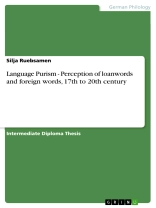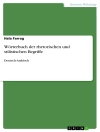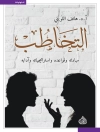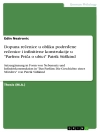Intermediate Diploma Thesis from the year 2002 in the subject German Studies – Linguistics, grade: A, University of Heidelberg (German Dpt.), language: English, abstract: Ich mache backup, du hast gedownloaded, wir sind outgesourct worden: Anglicisms, even after they have been assimilated into the German grammar and syntax, often appear out of place and seem a nuisance to many Germans, just because they break up word flow through their seemingly awkward position within the sentence, and because they often cause problems understanding them. More than two thirds of all Germans consider the advancement of foreign words annoying or even alarming, and it comes as no surprise that this number just about corresponds to the number of people who regard unchecked immigration as a threat.
German foreign word-phobia may not be an expression of notorious racism or xenophobia, but there are remarkable parallels and correlations between those two ressentiments, both concerning the time concurrency in which they peaked, and concerning reasoning and wording. In his seinem Traktat über Fremdwörter, Lutz Mackensen noted that
The loanword is a pariah to many. One eyes the other, whose color is different, one gets suspicious. His skin is not like one’s own, so he must be in an area he does not belong to. He is a troublemaker, he is a delinquent. Who accuses him protects himself.
Since the German language prevailed as a language of the vernacular as well as of science, the loanword has always been perceived as a foreign object in the body of the language: a treacherous virus infecting the pure blood of the language, a weed that threatens to poison or strangle the useful plants in a garden otherwise carefully kept. Those Metaphors are organic and therefore quite telling. More worrying, however, are the political analogies in our discussions about loanwords, for example when innocent words are close to terms from not-so-innocent times, such as in descriptions of loanwords as dirty bastards and barbarian hordes that threaten the nation.
… This essay will first outline the general functions of a loanword, then give an account of the history of German language purism between the Baroque in the 17th century and the end of the Second World War. The outlook will take a closer look at the ongoing debate about “Sprachpanscherei.”
Silja Ruebsamen
Language Purism – Perception of loanwords and foreign words, 17th to 20th century [EPUB ebook]
Language Purism – Perception of loanwords and foreign words, 17th to 20th century [EPUB ebook]
Mua cuốn sách điện tử này và nhận thêm 1 cuốn MIỄN PHÍ!
Ngôn ngữ Anh ● định dạng EPUB ● Trang 34 ● ISBN 9783656137030 ● Kích thước tập tin 0.5 MB ● Nhà xuất bản GRIN Verlag ● Thành phố München ● Quốc gia DE ● Được phát hành 2012 ● Phiên bản 1 ● Có thể tải xuống 24 tháng ● Tiền tệ EUR ● TÔI 3944256 ● Sao chép bảo vệ không có












